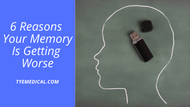6 Possible Reasons Your Memory Is Getting Worse
Written by TYE Medical on Feb 18th 2022
Not every memory problem is a red flag indicator of dementia or Alzheimer’s, so it’s probably not time to panic just yet. You’ll find there are several other explanations for the sticky notes on your computer screen, the numerous calendar alerts on your phone, and the checklist taped to the inside of your front door.
If you’re concerned that your memory problems are getting worse, consider these other factors that play an important role in how your mind functions and what you’re likely to remember–or forget.
1. You Are Multitasking and Not Focused

It may be that you’re just too busy, which means your mind isn’t focused enough to remember what it could under more normal circumstances. Have you ever left too many tabs open in your computer browser? If so, then you know that it seriously slows things down. It can be the same for our brains when we have too much going on at once.
While you might pride yourself on your multitasking abilities, juggling too much at once isn’t doing your mind or your memory any favors. The truth is that while it seems that you’re multitasking, you’re really only doing one thing well. Our brains just aren’t wired do multiple things well at the same time. How does this affect memory? It’s difficult to remember something you haven’t concentrated on because you’re splitting your attention with other things.
For example, if you don’t remember that you agreed to drive your son to meet his soccer team for pizza on Saturday afternoon, it could be because you were prepping dinner and texting your supervisor when he asked you. This isn’t a memory problem–it’s an attention problem characteristic of busy people.
2. You’re Battling Depression
Research indicates a link between depression and cognitive impairment. In other words, depression can affect your thinking, and by extension, your memory. It seems that the more depression symptoms you have the more likely you are to have memory issues. And if you struggled with depressive feelings at a younger age, studies suggest you’re more likely to have memory problems in midlife.
3. You Are Stressed or Anxious

If you’re an overly busy person, then chances are you’re also stressed or anxious. Anxiety and stress pose their own threats to a healthy memory. Whether you’re overloaded or have been experiencing long-term life pressures, stress hormones like cortisol can surge. And while you may welcome rising cortisol levels, relying on them to keep you alert and on task, this stress hormone negatively impacts memory.
And if you’re a chronic worrier, it can have the same stressful impact on your body, impacting your memory. In short, any type of stress or anxiety is going to derail your concentration and keep you from remembering what it seems you should.
4. You’re a Woman in Perimenopause or Menopause
Fluctuating hormones during the period leading up to menopause (perimenopause) and during menopause negatively impact memory for reasons researchers aren’t quite certain about. This means that as your body enters into this transitionary period, it can affect your thinking, specifically memory, in notable ways.
But there are also indirect factors that affect how well you remember things during all phases of menopause. During this time, you’re more prone to sleep disturbances, depression, and anxiety, all of which can also impact your memory.
On a more positive note, once you reach the other side of menopause and hormones level out, you’re likely to notice an improvement in how well you remember things.
5. You’re Not Getting Enough Quality Sleep

Whether it’s due to menopause or other possible reasons, a lack of good sleep can seriously disturb your memory. During the deeper stages of sleep your brain performs necessary housekeeping, clearing out specific proteins that can build up and affect memory and cognitive function. If you routinely miss these critical sleep stages, or if they aren’t long enough, some studies suggest toxins can build in the brain, affecting nerves and function.
If you’re struggling to get enough quality sleep, talk to your doctor about potential sleeping disorders and seek treatment for restless leg syndrome and sleep apnea. When you improve your sleep, it can boost memory and alertness throughout the day.
6. It Could Be a Thyroid Problem
When the thyroid isn’t producing enough thyroid hormone, it’s considered underactive and is called hypothyroidism. Noticeable symptoms of an underactive thyroid gland include brain fog and forgetfulness. Research also shows that it can shrink the hippocampus which is an area of the brain involved with short and long term memory. An overactive thyroid that produces too much thyroid hormone (hyperthyroidism) can also impact cognitive function for the worse and even make you more likely to develop dementia.
The bottom line is that thyroid hormones play a major role in metabolizing energy for various cells, even those in the brain. This means you should talk to your doctor about all your symptoms and have your thyroid hormone levels tested if you suspect a problem.
What Affects Your Memory May Affect Your Bladder
Several of the underlying causes for impaired memory can also indirectly impact your bladder and trigger leaks. As you identify and treat the causes, it’s important to have the right incontinence products for managing leaks.
TYE Medical offers Ultra-Thin pads for light incontinence as well as premium products designed for moderate to heavy leaks. Browse our online store and take advantage of FREE and discreet shipping on all orders.


